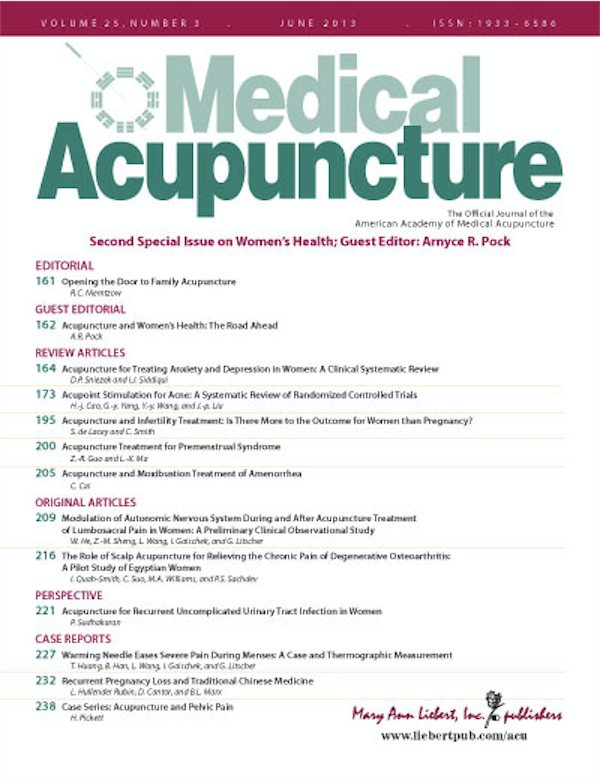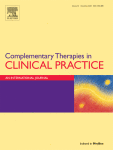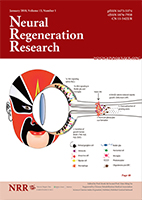Vertigo
How to submit an article:
- Registered users can submit any published journal article that has a unique DOI (Digital Object Identifier) name or link to Research Hub.
- For example, you can paste the full DOI link:
https://doi.org/10.1109/5.771073or just the DOI name:10.1109/5.771073into the field above and click submit. - The person who is first to submit a valid article to Research Hub will forever be credited for it, and every article submission earns you +6 Research Points.
Related Topics
Published research studies are articles that present the findings of original research that has undergone a peer-review process and has been made publicly available in scholarly journals, books or other media.

Acupuncture Therapy for Peripheral Vestibular Vertigo (with suspected Ménière's Disease)
2022 Jul 06 Medical Acupuncture Djaali W, Simadibrata CL, Nareswari I, Djaali NA
This case report shows that acupuncture therapy was very helpful for a patient with peripheral vestibular vertigo. Acupuncture can be used to treat patients who have vertigo and contraindications to pharmacologic therapies, and can to reduce side-effects of pharmacologic therapies.
Case Report Vertigo Acupuncture
Observation on the Efficacy of Moxibustion Combined with Ear Acupoint Pressing Beans in Treating Patients with Phlegm Stasis Syndrome Vertigo
2022 May 10 Emergency Medicine International Caidan Liu, Huanwen Luo, Zhongying Wang, Hong Luo, Yanlan Yu
Moxibustion combined with ear acupoint pressing bean treatment can clearly improve patients’ sleep quality, psychological state, relieve patients’ various symptoms caused by vertigo, improve blood flow parameters, and have better efficacy in the treatment of phlegm stasis syndrome vertigo.
Clinical Study
Tuina for cervical vertigo: A systematic review and meta-analysis of randomized controlled trials
2020 May Complementary Therapies in Clinical Practice Fan Huang, Siyi Zhao, Lin Dai, Zitong Feng, Zhennan Wu, Jia Chen, et al.
Tuina might improve the effectiveness rate and ESCV scores in patients with CV. However, the level of all the available evidence was low, and larger-scale and well-designed RCTs should be encouraged.
Systematic Review Meta-Analysis Meridian Massage
The Efficacy of Acupuncture for the Treatment of Cervical Vertigo: A Systematic Review and Meta-Analysis
2017 May 9 Evidence-Based Complementary and Alternative Medicine Zhuanzhuan Hou, Shibing Xu, Qinglin Li, Libing Cai, Weigang Wu, Huida Yu, et al.
Systematic Review Meta-AnalysisAcupuncture was more effective than conventional medicine therapy in effectiveness, improvement rate of vertigo and headache, and increased average blood flow velocity of vertebral-basilar artery.

Safety of different acupuncture manipulations for posterior circulation ischemia with vertigo
2016 Sep 6 Neural Regeneration Research Wen Y, Zhang C, Zhao Xf, Deng Sz, He S, Huang Lh, et al.
Randomised Controlled Trial Headache & MigraineA 14-session course of needling at Fengchi is relatively safe for treating posterior circulation ischemia with vertigo.
Research insights are moderated by the Research Hub team and offer an at-a-glance overview of interesting research findings.

2017 Evidence-Based Complementary and Alternative Medicine
Acupuncture was more effective than conventional medicine therapy in effectiveness, improvement rate of vertigo and headache, and increased average blood flow velocity of vertebral-basilar artery.
Systematic Review
The Efficacy of Acupuncture for the Treatment of Cervical Vertigo: A Systematic Review and Meta-Analysis
Zhuanzhuan Hou, Shibing Xu, Qinglin Li, Libing Cai, Weigang Wu, Huida Yu, et al.

2016 Neural Regeneration Research
A 14-session course of needling at Fengchi is relatively safe for treating posterior circulation ischemia with vertigo.
Randomised Controlled Trial Headache & Migraine
Safety of different acupuncture manipulations for posterior circulation ischemia with vertigo
Wen Y, Zhang C, Zhao Xf, Deng Sz, He S, Huang Lh, et al.

2015 BMC Complementary Medicine and Therapies
Acupuncture demonstrates a significant immediate effect in reducing discomforts and VAS of both dizziness and vertigo.
Clinical Study Headache & Migraine
Efficacy and safety of acupuncture for dizziness and vertigo in emergency department: a pilot cohort study
Chiu, CW., Lee, TC., Hsu, PC. et al.
Review Articles
Review articles summarise and critically evaluate the current state of research on a specific topic or field by synthesising multiple primary research studies.

Tuina for cervical vertigo: A systematic review and meta-analysis of randomized controlled trials
2020 May Complementary Therapies in Clinical Practice Fan Huang, Siyi Zhao, Lin Dai, Zitong Feng, Zhennan Wu, Jia Chen, et al.
Tuina might improve the effectiveness rate and ESCV scores in patients with CV. However, the level of all the available evidence was low, and larger-scale and well-designed RCTs should be encouraged.
Systematic Review Meta-Analysis Meridian Massage
The Efficacy of Acupuncture for the Treatment of Cervical Vertigo: A Systematic Review and Meta-Analysis
2017 May 9 Evidence-Based Complementary and Alternative Medicine Zhuanzhuan Hou, Shibing Xu, Qinglin Li, Libing Cai, Weigang Wu, Huida Yu, et al.
Systematic Review Meta-AnalysisAcupuncture was more effective than conventional medicine therapy in effectiveness, improvement rate of vertigo and headache, and increased average blood flow velocity of vertebral-basilar artery.
Clinical Trials
Clinical trials are research studies that involve people and are conducted to evaluate the safety and efficacy of new treatments or interventions, such as drugs, medical devices, or behavioural therapies.
Study Protocols
Published study protocols are detailed plans that outline the objectives, methodology, statistical analyses, and organisation of a research study that have been made publicly available for others to review and use as a reference.
Presentation Slides

Systematic Review
Acupuncture was more effective than conventional medicine therapy in effectiveness, improvement rate of vertigo and headache, and increased average blood flow velocity of vertebral-basilar artery.
Zhuanzhuan Hou, Shibing Xu, Qinglin Li, Libing Cai, Weigang Wu, Huida Yu, Huade Chen

Randomised Controlled Trial
A 14-session course of needling at Fengchi is relatively safe for treating posterior circulation ischemia with vertigo.
Wen Y, Zhang C, Zhao Xf, Deng Sz, He S, Huang Lh, Tian G, Meng Zh

Clinical Study
Acupuncture demonstrates a significant immediate effect in reducing discomforts and VAS of both dizziness and vertigo.
Chiu, CW., Lee, TC., Hsu, PC. et al.
Executive Summary
Write an executive summary in the form of a blog article on the topic of "Research into Chinese medicine treatment for Vertigo" summarising the research below and using language that can be easily understood by patients and avoiding medical jargon using a professional and caring tone of voice.
Write an executive summary in the form of a blog article on the topic of "Researched Chinese medicine treatments for Vertigo" summarising the research below in an objective and easy to understand way, and using language that can be easily understood by patients. Group the article into Chinese medicine treatments first, followed by nutrition and other treatments. Avoid using medical jargon and use a professional and caring tone of voice.
Write me a concise but easy to understand executive summary on the topic of "Chinese medicine treatments for Vertigo" based on the following research that I will give you. Your summary should be 2 paragraphs long in Australian English spelling and include references to the studies.
A Systematic Review published in 2017 in the journal Evidence-Based Complementary and Alternative Medicine found that Acupuncture was more effective than conventional medicine therapy in effectiveness, improvement rate of vertigo and headache, and increased average blood flow velocity of vertebral-basilar artery. This systematic review and meta-analysis based on current evidence suggested that acupuncture may be more effective in effectiveness and improvement of clinical symptom and average blood flow velocity of vertebral-basilar artery compared with conventional medicine therapy for CV. However, the findings should be insufficient to make a firm conclusion due to a lack of studies with high methodological quality. Further rigorously designed studies and higher-quality trials with larger sample size are necessary to confirm the effectiveness and safety of acupuncture for CV.
A Randomised Controlled Trial published in 2016 in the journal Neural Regeneration Research found that A 14-session course of needling at Fengchi is relatively safe for treating posterior circulation ischemia with vertigo. Acupuncture at Fengchi (GB20) in the posterior neck improves vertigo. However, subarachnoid hemorrhage and spinal epidural hematoma have been reported to occur after acupuncture in the posterior neck. Therefore, in the present study, we assessed the safety of acupuncture at Fengchi. Of the 136 patients, 120 completed the study. There were no significant differences between pretreatment and posttreatment test results in any of the groups. Only five patients suffered from minor adverse events (needling pain, slight hematoma and transient chest tightness). No serious adverse events were found. Our results indicate that a 14-session course of needling at Fengchi is relatively safe for treating posterior circulation ischemia with vertigo.
A Clinical Study published in 2015 in the journal BMC Complementary Medicine and Therapies found that Acupuncture demonstrates a significant immediate effect in reducing discomforts and VAS of both dizziness and vertigo. Acupuncture demonstrates a significant immediate effect in reducing discomforts and VAS of both dizziness and vertigo. This study provides clinical evidence on the efficacy and safety of acupuncture to treat dizziness and vertigo in the emergency department.
Moderation Tools
Topic
Sign In
Users not signed in are limited to viewing the 5 most recent items of content.